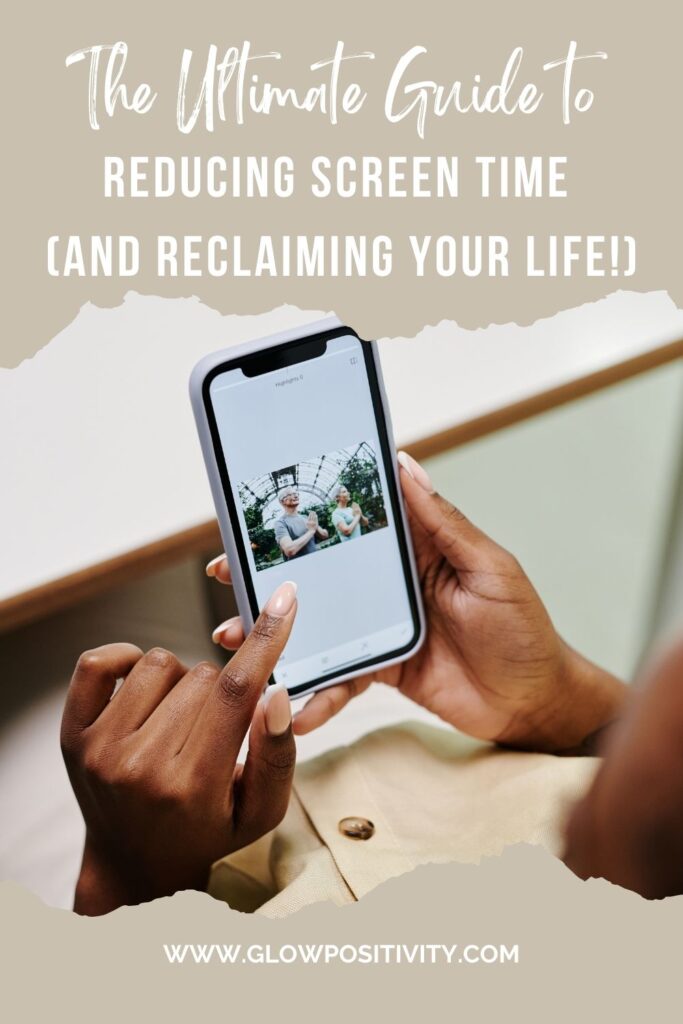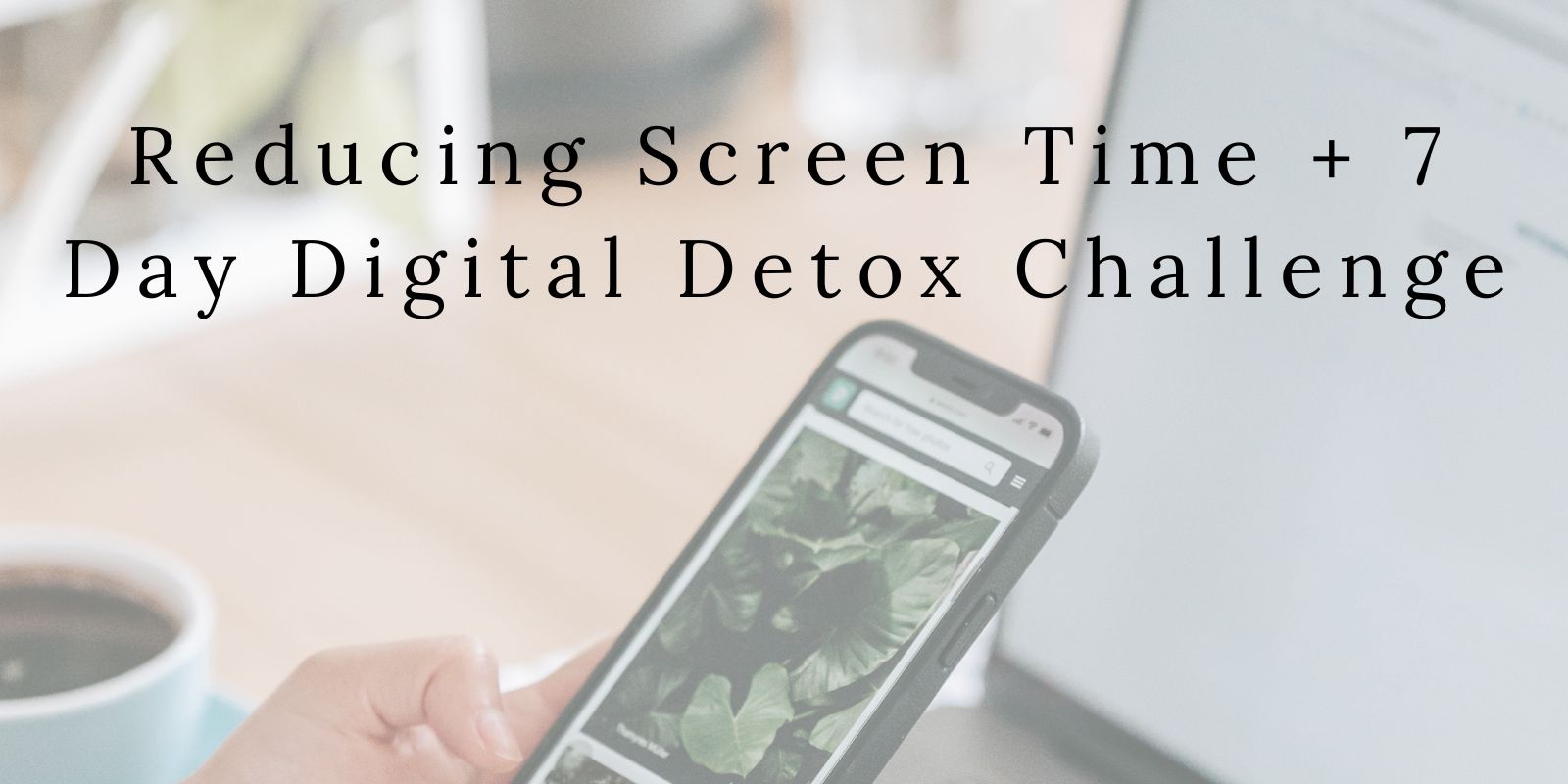Practical Ways to Reduce Screen Time
Our devices have taken over our lives. Have you ever forgotten your phone or had it run out of battery? It’s hard to imagine being without it. The fear of missing out is real, but the fear of missing out on your life should be even greater. The average mobile phone screen time right now is alarming: hours per day, weeks, months, and years. It’s scary how much time we are spending on screens. Imagine if someone was selling a pill that could give you an extra X hours per day. You’d probably consider taking it, but we are happy to mindlessly waste away our time on our devices.
It’s not just the screen time that matters. What you’re doing on that screen is important too. If you’re using your phone or device productively, that’s great! But most of us spend hours mindlessly scrolling. Connecting with friends and family, using your device for maps or productivity, and creating are all great ways to use it. But in reality, much of our time is spent on social media, looking at other people’s lives, while simultaneously wasting our own.
Don’t get me wrong; you can use social media for many great things, like inspiration. However, constantly looking at others can create a lot of negative feelings. Not everyone’s life is as perfect as it appears online. Many influencers aren’t as wealthy as they seem, and some even go into debt to maintain a “luxury lifestyle”.
Top Tips for Lowering Screen Time
Put Your Phone on Grayscale
You can find this in your settings, and it will make your screen black and white. The way this works is by making your phone less exciting. Without bright, flashing images, it’s easier to put the phone down.
App Blockers
One of the best ways to stop yourself from mindlessly scrolling is to use an app blocker. The screen time limits on your phone can be bypassed easily, so try a different app to limit your time.
Rearrange Your Apps
Certain apps, like Facebook, make you subconsciously click on them. You can easily lose 15 minutes without even realizing it. By moving these apps, you create an extra barrier to stop yourself.
Turn Off Notifications
Only keep notifications on for calls and texts that are important. Turn off notifications for other apps and at certain times of the day. You don’t need to be notified every time something happens.
Keep Your Phone Out of Sight
If you can see your phone, you’re more likely to pick it up for no reason. However, if you put it in a drawer or another room, it takes more effort to check it. Over time, you’ll break the habit.
Breaking the habit of social media alone can be difficult enough. Try stepping away from social media for a while. Not only does it cause anxiety and depression, but it also uses these feelings to target us, encouraging us to spend money on things we don’t need or want. We often buy things we don’t want just to impress people we don’t even like. Social media is filled with sponsored ads, and every post from influencers is usually pushing a product.
The Science Behind Screen Addiction
It’s easy to look at your screen time and be really disappointed in yourself with how much time you’ve spent on there. The thing is that it’s not all down to us. Our devices have been designed to be as addictive as possible. Particularly social media apps, which have been designed to be like Las Vegas slot machines. Every time you pull down, you see something new and get a little hit of dopamine. This is what keeps you coming back for more and how we end up wasting so much time. One of the best documentaries to watch is The Social Dilemma. Digital dopamine addiction is such a real issue. A 2018 study in NeuroRegulation examined the impact of excessive screen time on dopamine pathways in the brain. It found that the constant stimulation from digital content—such as social media notifications and viral videos—hijacks the brain’s reward system, making real-life activities feel less engaging. This explains why many people struggle with digital addiction and compulsive phone-checking.
The Impact of Screen Time on Mental and Physical Health
Living our lives through the highlight reels of everyone else’s can have serious impacts. Comparison and self-esteem issues can lead to anxiety and depression. Unfortunately, most of the things we’re looking at and feeling jealous of aren’t real. With photo editors and filters easier than ever to use, comparing your natural body to a highly edited image of someone else is bound to have a negative effect on your mental health.

Not only is excessive screen time terrible for our mental health, but getting stuck in a rut scrolling all day takes a toll on our physical health too. Firstly, if you’re sitting scrolling for two hours, that’s two hours of sedentary activity (probably sitting in an uncomfortable position), which can lead to bad posture, mainly in the neck and back, but depending on how you’re sitting, it can affect other areas too! Eye health is also a major concern; we know blue light isn’t great for us, but staring at a small screen causes havoc on our eyes, leading to eye strain, especially when we hold our devices so close to our faces.
How to Replace Screen Time with Meaningful Activities
Going cold turkey and putting down your phone is probably going to last about two minutes until you’re bored and about to pick it right back up again. Replacing your screen time with other activities provides you with not only a more meaningful use of your time but also keeps you busy and less likely to fall straight back into the habit of picking your phone up. Alternative activities like reading, exercising, meditating, journaling, or picking up a hobby you love to do can help.
Not all screen time is a complete waste of time. You can use screens productively by learning through videos, online courses, creating digital art, writing, or planning. These can be great ways to use screen time without the addictive qualities.
How Social Media Affects Productivity and Focus
Constant notifications and endless scrolling impact concentration levels and keep us distracted all day long. Multitasking with screens lowers efficiency and causes us stress by making us overwhelmed with so many things to keep track of. To stay focused, strategies like deep work, time-blocking, and digital detoxes are all great ways to help yourself stay on track and overcome the tricks from the social media companies who make money from us being addicted to our phones.
The Role of Digital Minimalism
Digital minimalism is a philosophy that encourages intentional and mindful technology use rather than allowing screens to dominate your life. Instead of eliminating technology completely, it promotes using digital tools only in ways that add value and avoiding mindless scrolling or distractions.
Declutter Your Digital Life
Remove unnecessary apps, reduce social media use, and turn off non-essential notifications.
Set Boundaries
Establish phone-free zones, schedule deep work sessions, and limit screen time.
Prioritize Real-Life Activities
Replace screen time with activities you love like reading, exercise, hobbies, and face-to-face interactions.
Be Intentional with Social Media
Follow meaningful accounts and unfollow everyone who makes you feel bad about yourself, set app limits, and avoid doom-scrolling.
By practicing digital minimalism, you can reduce stress, improve focus, and reclaim your time for more fulfilling activities.
7-Day Digital Detox Challenge
If you’re ready to take control of your screen time and create healthier digital habits, try this 7-day digital detox challenge. Each day introduces a simple yet effective step to help you reduce screen time, regain focus, and be more present in your life.
Day 1: Track Your Screen Time & Set a Goal
- Check your daily screen time report.
- Set a goal to reduce screen time (e.g., 30 minutes less per day).
Day 2: Declutter Your Digital Space
- Organize your home screen to reduce distractions.
- Unsubscribe from emails and turn off excess notifications.
- Delete unnecessary apps.
Day 3: Establish No-Phone Zones
- Keep your phone out of reach during meals and social time.
- Set up a phone-free area in your home.
- Use an alarm clock instead of your phone in the bedroom.
Day 4: Turn Off Non-Essential Notifications
- Disable notifications for social media and emails.
- Set specific times to check messages and updates.
Day 5: Replace Screen Time with Real Activities
- Choose a hobby to replace scrolling (e.g., reading, exercising).
- Plan an outdoor activity or social meetup.
- Listen to podcasts or audiobooks instead of scrolling.
Day 6: Set Screen-Free Mornings & Evenings
- Avoid screens for 30 minutes after waking up.
- Turn off screens 1 hour before bed.
- Try reading or journaling instead of late-night scrolling
Day 7: Try a Full Digital Detox Day
- Keep your phone on airplane mode or in another room.
- Plan a day filled with non-digital activities.
- Reflect on how you feel and decide which habits to keep.

